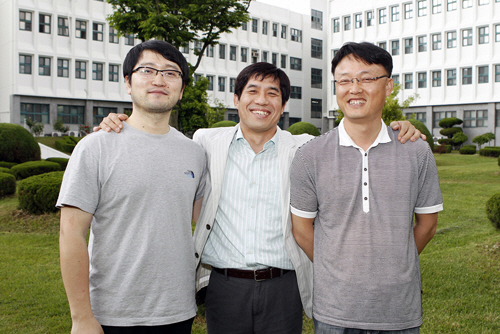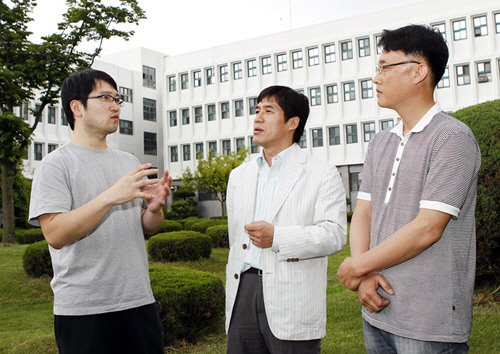Department of Life Sciences Receives Minister of Environment's Award for Third Straight Year N
No.88498- Writer YU
- Date : 2012.06.12 13:17
- Views : 10441
Professor Park, Seon-joo in 2010, Doctor Song, Im-geun in 2011, Graduate school student Park, Seong-jun in 2012
Nation's only research team that studied the ecology of Dokdo for the past decade, being the first to claim the 'ecological sovereignty of Dokdo'
Researching the development of DNA markers for Korean special plants
[May 21, 2012]
Professor Park, Seon-joo's lab of the Department of Life Sciences won the Minister of Environment's award for the third straight year on the 'World Wetlands Day'.

From left to right, Park, Seong-jun, Professor Park, Seon-joo, Dr. Song, Im-geun
The winners of the award are Professor Park, Seon-joo (46), Song, Im-geun (40) who acquired his PhD in last February, and Park, Seong-jun (33), who is to expected to receive his PhD in August of this year. Starting with Professor Park, Seon-joo in 2010, Dr. Song, Im-geun won the award in 2011 and graduate school student Park, Seong-jun won the award at the '2012 World Wetlands Day' held in Jeung-do in Shinan-gun, Jeonnam on the 17th.
It is very rare for a professor and her students to receive the Minister of Environment award for three straight years from one lab. However, this may be obvious when taking into account the achievements and status of the research by Professor Park's team that is assessed to be unparalleled in research on the ecology and genomes of Dokdo.
Professor Park's team began research being interested in the ecology of Dokdo since 2003, and from 2009, it received support from the Ministry of Education, Science and Technology, the National Research Foundation of Korea and the Ministry of Environment. In result, the team discovered in April 2009 that the Dokdo Aster spathulifolius Max. was transmitted to Japan and registered the genome sequence of the Aster spathulifolius Max. in the National Center for Biotechnology Information in April 2010, thus contributing in receiving international certification as a native plant of Dokdo. In 2011, it completed the chloroplast genome map of the Dokdo Aster spathulifolius Max. Also, in 2010, it revealed that the origin of the spindle tree that are widespread in Dokdo was from Jejudo and Yeosu, Jeonnam. Likewise, the team is a pioneer in the ecological research of Dokdo.
Professor Park's research team, which was the first to claim the 'ecological sovereignty for Dokdo', procured over 50 different plants growing in Dokdo for comparison and analysis to create a gene bank of the native plants of Dokdo. During this process, Dr. Song, Im-geun published a paper that compared and monitored the genes of 19 types of naturalized plants in Dokdo to promote the interest of academia on the meaning and value of the ecological sovereignty of Dokdo in the <Korean Journal of Environment and Ecology>.
Furthermore, the research team is also working hard to preserve the genes of the plant life native to Korea. As part of this, it has begun working on the development of a 'DNA marker' for making it easy to differentiate Korean native plants from Chinese plants. Recently, it successfully developed DNA markers for the Cnidii Rhizoma and published it in the <Korea Association of Herbology> in 2009 and applied for domestic patents in May 2010. In the past December, the DNA markers of the Astragalus membranaceus were published in the <Korean Society of Food Science and Technology> and in April of this year, it published the 'Rubi Fructus' DNA marker in the SCI level <Journal of the Korean Society for Applied Biological Chemistry>. Meanwhile, the team is also monitoring the wetlands of the Daegu and Gyeongbuk regions.

Park, Seong-jun, Professor Park, Seon-joo and Dr. Song, Im-geun (from left to right) are chatting in front of the Department of Life Sciences Building
Dr. Song, Im-geun is planning to concentrate on research to prevent the destruction of the ecology for Korean special plants and to procure genetic resources through studies in the 'Conservation Biology' field. Park, Seong-jun dreams of finding the missing link for plant evolution through 'Plant Systematics'. Park had won an award of outstanding paper for his paper by the <Korean Society of Plant Taxonomists> for being the first to do research on plant life of the 'columbine meadow rue' species(Thalictrum aquilegiifolium), which is a perennial herb of the Ranunculaceae family that contains the secrets behind the middle-phase of plant evolution in August 2010.
Professor Park, Seon-joo, who guided them for their paper said, "I am excited that my students, who I spent lots of time with for the past 6 years, were given this award and recognized for their achievements in research," while adding, "I hope them to work harder on their research with the mission that basic science sector is not just some academic theory that has nothing to do with reality, but can reflect reality and offer social messages."